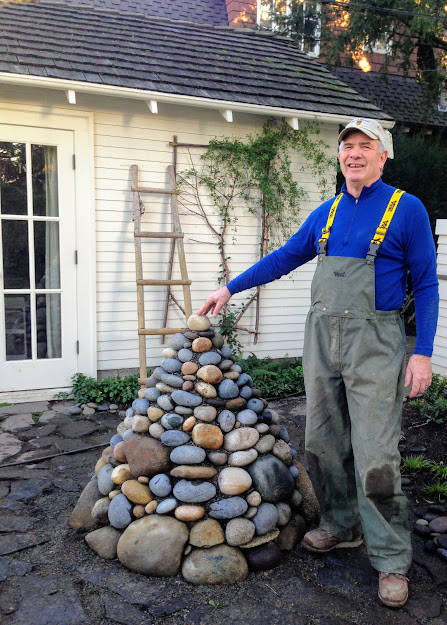By Gretchen Wing
The interview begins the way Terry Wean’s life restarted in 1991: with a jolt. He had just received his masters in fine arts in fiction from the University of Montana when he was diagnosed with a brain tumor. “I had to go home and say goodbye to my children because they were pretty certain that I would die,” Terry says. He was 41.
But after 16 hours of surgery, Terry lived. And he quit writing. Not only was reading difficult but “all that stuff that seemed so important, getting my novel published… suddenly seemed really sophomoric. I had to figure out what’s important with my life.”
Unhappy in his marriage, Terry found the feeling unchanged after his recovery. When his best friend suddenly died, that was the push Terry needed. He dived into the physicality of his stonemasonry work, which had been merely paying the bills, and he got a divorce. Then in 1996, Terry returned to Washington, looking for his old friend, Capper Heffernan, with whom he’d always been in love.
But how did Terry’s masonry begin? In the late ‘70s, Terry and his wife bought land near Mount Baker, which contained an old quarry, full of beautiful serpentine. He started blasting it, teaching himself to build a fireplace. To support his family, he sold stone, but soon realized he could do better selling his services: “My answer was always ‘yes’: ‘Can you do this?’ ‘Yes.’ Then I’d go to the library and learn how.”
“Stonework is like music,” Terry says. Only a musician would say that.
Born into a large, “chaotic” family in Tacoma, Terry was the artistic one, and his mom enrolled him in art lessons. His dad, a civil engineer for the railroads, moonlighted as a bouncer. Terry notes with awe how hard both parents worked, sending seven kids through college. Following jobs, the family moved to Montana; then Minnesota; then Tulsa, Oklahoma. There, adolescent Terry taught himself guitar by watching TV.
Artists are sensitive. “If anything shaped my life, it was the violence of that time,” Terry says. When JFK was assassinated, his fellow students in Tulsa were joyful; Terry was revolted. His newly integrated high school oozed with “livid hatred, right out in the open.” Terry got a job lifeguarding at Tulsa Country Club, where Black schoolmates brought him lunch, and he wasn’t allowed to “fraternize” with them. Disgusted, Terry hitchhiked to Taloga, Oklahoma, and signed up with a wheat harvesting team. The work was hard and the company wild, but Terry liked it.
Because his mother insisted on college, Terry started, but soon dropped out. Like so many in 1968, he went to San Francisco, grew his hair and fell in love with the Western outdoors. Needing money, he worked nine months in a steel mill back home. But the West called and he moved back to Utah, where he met a girl. They got married and had a baby, but “that didn’t work out.” Single and depressed, Terry joined a friend reef-netting on Lummi Island. That’s where he met Capper Heffernan, who was not single at the time.
Terry liked the work on Lummi, but found himself relying on a two-word vocabulary: “Fish and beer.” So he went back to school at Fairhaven. There, through happy accidents and sheer moxie, he became a playwright.
He also met a woman and became a husband again, and a father of two more kids, and a landowner. While building a log home with his wife, Terry was recruited to write a play for the Hunger Project, and he kept on writing, including a hit children’s musical.
Terry ventured as far as Los Angeles, to write for television. But he refused to move there, flying back and forth, and finally rejected L.A.’s higher payoffs for the dream of being published. That’s when he and his family moved to Missoula—and confronted cancer.
Post-divorce, Terry courted Capper, a lengthy process. In 1997 he came to Lopez for a stonework job at Sperry, which lasted over four years and paid well. Capper was running a paper store in Seattle, so even after the couple married in 1999, Terry continued to commute, putting in a stint teaching English at Seattle Central. The Sperry job led to another multi-year project, which paid for a home and acreage in the middle of the island.
In 2016, Capper finally moved her store to Lopez. Terry still works, but selectively. Together, at last, the couple is very happy.
Stonemason, poet, musician, songwriter… while most of Terry’s facets show themselves in the space of our interview, the language of his own website captures Terry best. Working from a quote by Theodore Roethke, Terry writes, “I have undone myself loving stone, in the moonlight, in the riverbed, in the rain, on the talus slope, deep in the woods, beside the path, and by the side of the road covered with dust. My life is the story of an apprenticeship to beauty.”




